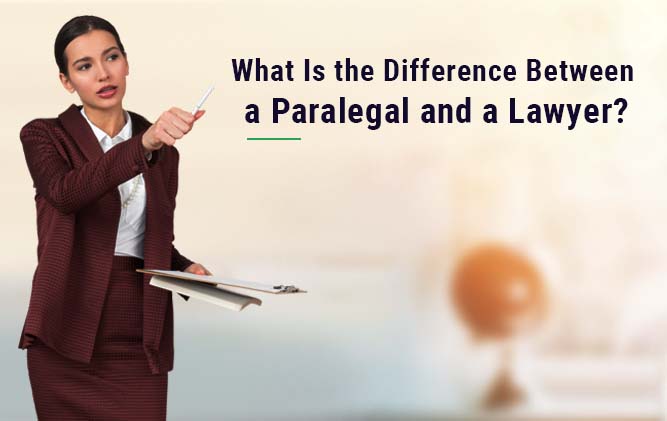Many people are familiar with the job description of a lawyer. A lawyer provides counsel and represents businesses, individuals, and government agencies in legal matters and disputes. We get to see lawyers in action most often in television shows, movies, true crime documentaries and in media coverage on high-profile cases. It is safe to say that the majority of people have a strong understanding of the tedious but impactful role a lawyer has in society.
However, very few people are aware of paralegals and what exactly their role is in the legal process. For many legal matters, a paralegal may actually be the better choice, and more importantly, choosing this lesser-known but equally important legal representative could save you a lot in legal fees. In this blog post, we break down the differences between a lawyer and a paralegal in Ontario and how that impacts you.

Lawyers
In Ontario, a lawyer must complete an undergraduate Bachelor of Laws (LL.B.), a Juris Doctor (J.D.), or some equivalent of those courses. Upon successful graduation from those awards, they must then sit and pass the Barrister Licensing Examination (known popularly as the bar exam) and the Solicitor Licensing Examination. Once the prospective lawyer has completed the above, as well as registering with the correct legal society, they are eligible to practice law in Ontario. As you can imagine, this collective process is a time, effort and financially intensive undertaking to ensure that only those truly dedicated to serving and protecting the community in legal matters successfully go on to become practising lawyers. As such, lawyers are eligible to represent Ontarians in all aspects of law including:
- Family law (marriages, divorces, child custody disputes)
- Estate law (wills, power of attorney, asset liquidation)
- Real Estate law (purchase and selling of private and commercial properties)
- Criminal law (all types of offences in all categories of severity)
- Civil law (litigation, property damage, etc)
- Administrative law (legal paperwork, government law)
Is a lawyer right for me?
Due to the intense education and training requirements to enter the profession, many lawyers will charge relatively high costs to take on a case, which are often charged by the hour and with a minimum spend threshold. Many exceptionally good lawyers will also be working at prestigious private law firms which can add to their cost, but also potentially increase their likelihood of winning a case due to experience and their law firm’s reputation. If your case is worth a significant amount of money, deals with a severe criminal offence, or has any other high stakes attached to them, then a lawyer is likely your best option for achieving the outcome you desire. Whilst the legal costs will be significantly higher than if you went with a paralegal, there are several legal issues only a lawyer is licensed to help you deal with, and the added weight of a high-profile legal firm may help sway the case in your favour.
Paralegals
Unlike other provinces in Canada, paralegals are a regulated and recognised legal professionals eligible to represent clients in a range of legal issues independently of a lawyer. To become a paralegal, a person must complete a paralegal certificate, diploma or degree at an accredited educational institute like Cestar College in Toronto. This must also include 120 hours of intern placement in a legal environment such as a private law firm or government law office. Once a prospective student has successfully completed their course, they must also sit and pass the Paralegal Licensing Exam (P1). Following that, they must register with a Paralegal society in Ontario and they are ready to represent clients. Paralegals can only represent clients in a select range of legal cases, including:
- Small Claims Court (for cases worth up to $25,000)
- Traffic offenses (parking fines, speeding infractions, etc.)
- Tribunals and Boards (rental property issues, workplace insurance and safety board)
- Summary Convictions (shoplifting, trespassing, fines up to $5,000 or 6 months jail time)
- Licensing cases (Liquor License Act cases, vehicle insurance charges, Dog Owner’s Liability Act)

Is a paralegal right for me?
Paralegal educational and registration requirements are not as stringent as lawyers, and this is generally reflected in their costs. As many of the cases that a paralegal can assist with are generally lower risk and lower severity, spending a huge amount on a lawyer would likely not be financially viable. However, the significantly lower costs associated with hiring a paralegal would be a lot more manageable and aid in achieving a favourable outcome in your case. If your case is relatively minor but significant enough for you to want an experienced legal representative on your side, a paralegal is a great option for you.
Are you interested in becoming a paralegal? In our latest blog “What is a Paralegal? Career paths, average salaries & more!” we go into even more detail on the specific duties and qualifications of a paralegal. We also showcase the various career paths a paralegal can take with their skills and the average salaries one can make in Ontario at different stages of their careers.
Paralegals vs. Lawyers in Ontario
The differences between lawyers and paralegals in Ontario are mainly defined by the different types of legal issues each can help clients with. Whilst lawyers are able to represent their clients in all areas of law, they come at a hefty financial cost which may outweigh the potential reward from pursuing the case. On the other hand, paralegals can only assist in select legal arenas, but they often cost significantly less and their degree of specialisation will allow them to be well versed in that particular area. Which one you decide you need will depend on your case and its complexity or severity, so consider what kind of assistance you’re likely to need and choose accordingly.
Cestar’s Paralegal Program
I completed the paralegal program at Cestar College this year. The staff and faculty were all very helpful and knowledgeable. Instructors with real-world experience that they shared with the students. I feel that Cestar has given me the tools required to start my own practice with confidence. Recommended. – Joe Behar
By applying to Cestar College’s Paralegal program, you’re choosing:
- One of the most comprehensive paralegal curriculums in Ontario, covering all aspects of law that paralegals can practice, such as Legal Research and Writing, Administrative Law, Employment Law, Criminal Law, and much more!
- A paralegal program accredited by the Law Society of Ontario (LSO).
- 1100 hours of learning, including 120-hours of work placement, giving you the benefits of real-life work experience while still in school.
- Small class sizes that foster discussion-based education and provide a welcoming learning environment for all students.
- Dedicated instructors with years of experience as lawyers and paralegals who take pride in seeing their students succeed.
- A challenging but rewarding learning experience full of support from all Cestar College faculty and administrators.
Choosing Cestar College means enrolling in a Paralegal program designed to satisfy your educational requirements while exceeding your post-secondary expectations.
If you are interested in getting more information about our Paralegal Training Program here at Cestar College, head over to our course outline page. If you have any questions, we’d be very happy to help. Contact us today!


